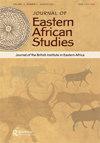“比以前好多了”:乌干达的大坝建设和对过去发展的理解
IF 0.6
3区 社会学
Q2 AREA STUDIES
引用次数: 2
摘要
摘要本文阐述了发展话语是历史建构和偶然的,展示了对发展项目采用话语和历史方法的价值。它将乌干达最近和晚期的殖民大坝建设并置,分别使用欧文瀑布和布贾加里大坝,将过去和现在带入对话。关注历史作为过去事件的代表,表明行动者对发展比喻的表达如何与历史联想和主张密切相关,以及行动者如何在讨论发展的同时利用近代历史来推进当代目标。例如,通过与浪漫化的过去进行不利的比较,对当代情况的批评得到了加强,发展规划者通过将发展项目与以前的干预措施不同来证明他们的行动是合理的。这一历史视角确定了专注于当下的方法可能会错过的发现,包括已故殖民政府强调其项目的小规模性质的方式,以及对当代乌干达欧文瀑布的积极回忆(尽管该项目没有实现其目标);因此,大型发展项目不应只从表面上失败的角度来分析。这种方法还说明了发展思想在不同的历史背景下是如何以不同的方式表达的,包括在当代更加个性化和多样化的应用。本文章由计算机程序翻译,如有差异,请以英文原文为准。
‘Much better than earlier’: dam-building in Uganda and understanding development through the past
ABSTRACT This article illustrates that development discourses are historically constructed and contingent, demonstrating the value of adopting a discursive and historical approach to development projects. It juxtaposes recent and late-colonial Ugandan dam-building, using Owen Falls and Bujagali dams respectively, to bring the past and present into conversation. Focusing on history as the representation of past events shows how actors’ articulation of development tropes is intimately linked with historical associations and claims, and how actors use recent history to advance contemporary aims while discussing development. For example, critiques of contemporary situations are strengthened through unfavourable comparison with a romanticised past, and development planners justify their actions by presenting development projects as different from previous interventions. This historical lens identifies findings that an approach focused on the present might miss, including the ways the late-colonial government emphasised the small-scale nature of its projects and positive remembrances of Owen Falls in contemporary Uganda (in spite of the project not achieving its objectives); large-scale development projects should therefore not only be analysed from the perspective of their ostensible failure. This approach also illustrates how ideas of development are articulated differently in different historical contexts, including more individualised and divergent applications in the contemporary period.
求助全文
通过发布文献求助,成功后即可免费获取论文全文。
去求助
来源期刊

Journal of Eastern African Studies
AREA STUDIES-
CiteScore
3.30
自引率
7.10%
发文量
12
期刊介绍:
Journal of Eastern African Studies is an international publication of the British Institute in Eastern Africa, published four times each year. It aims to promote fresh scholarly enquiry on the region from within the humanities and the social sciences, and to encourage work that communicates across disciplinary boundaries. It seeks to foster inter-disciplinary analysis, strong comparative perspectives, and research employing the most significant theoretical or methodological approaches for the region.
 求助内容:
求助内容: 应助结果提醒方式:
应助结果提醒方式:


